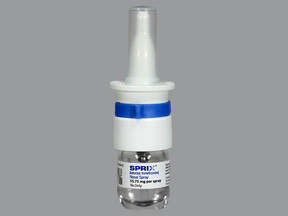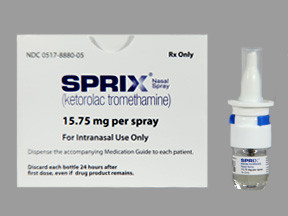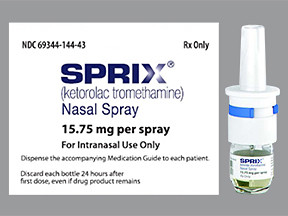KETOROLAC SPRAY - NASAL
PHONETIC PRONUNCIATION: (KEE-toe-ROLE-ak)
COMMON BRAND NAME(S): Sprix
GENERIC NAME(S): ketorolac tromethamine
Uses
USES: Ketorolac is used for the short-term treatment (up to 5 days) of moderate to severe pain in adults, such as after surgery. Reducing pain helps you recover more comfortably so you can return to your normal daily activities. This medication is a nonsteroidal anti-inflammatory drug (NSAID). It works by decreasing inflammation, swelling, and pain.
How to use KETOROLAC SPRAY - NASAL
HOW TO USE: Read the Medication Guide provided by your pharmacist before you start using ketorolac and each time you get a refill. Also read and follow the product instructions for how to properly prime and use this nasal spray. If you have any questions, ask your doctor or pharmacist. Spray this medication in your nose as directed by your doctor, usually every 6 to 8 hours. Your doctor may adjust your dosage so that you spray the medication in only one nostril instead of both nostrils. The dosage is based on your medical condition, age, weight, and response to treatment. To reduce your risk of stomach bleeding and other side effects, use this medication at the lowest effective dose for the shortest possible time. Do not increase your dose or use this drug more often or for longer than prescribed. Your condition will not improve any faster, and your risk of side effects will increase. Use this medication regularly to get the most benefit from it. To help you remember, use it at the same times each day. If you are using this drug "as needed" (not on a regular schedule), remember that pain medications work best if they are used as the first signs of pain occur. If you wait until the pain has worsened, the medicine may not work as well. Drink plenty of fluids during treatment with this medication. This will help reduce the risk of kidney problems. Avoid getting this medication in your eyes. If this occurs, rinse your eyes with water or saline and call your doctor if eye irritation persists. Tell your doctor if your condition does not improve or if it worsens.
Side Effects
Precautions
Interactions
Overdose
Images
Reviews
Warning
WARNING: Do not use any ketorolac products (including this nasal spray, tablets, or injection) for more than a total of 5 days. Do not use this medication for minor or long-term painful conditions. This drug may rarely cause serious (rarely fatal) bleeding from the stomach or intestines. This effect can occur without warning at any time while using this drug. Older adults may be at higher risk for this effect. Do not use this medication if you have stomach/intestinal problems (such as ulcers, bleeding). This drug may also increase your risk of serious bleeding in other parts of your body. Do not use this medication if you have bleeding or blood clotting problems, or are at high risk for bleeding. Nonsteroidal anti-inflammatory drugs (including ketorolac) may rarely increase the risk for a heart attack or stroke. This effect can happen at any time while using this drug but is more likely if you use it for a long time. The risk may be greater if you have heart disease or increased risk for heart disease (for example, due to smoking, family history of heart disease, or conditions such as high blood pressure or diabetes). Talk to your doctor about the benefits and risks of using this drug. Do not use this drug right before or after heart bypass surgery (CABG) or before any surgery. It also should not be used during labor/delivery or in people with severe kidney problems or high risk for kidney problems. Stop using ketorolac and get medical help right away if you notice any of the following rare but serious side effects: bloody or black/tarry stools, stomach/abdominal pain, vomit that looks like coffee grounds, unusual or easy bruising/bleeding, chest/jaw/left arm pain, shortness of breath, unusual sweating, weakness on one side of the body, sudden vision changes, slurred speech.
Disclaimer
IMPORTANT: HOW TO USE THIS INFORMATION: This is a summary and does NOT have all possible information about this product. This information does not assure that this product is safe, effective, or appropriate for you. This information is not individual medical advice and does not substitute for the advice of your health care professional. Always ask your health care professional for complete information about this product and your specific health needs.



No Reviews Yet